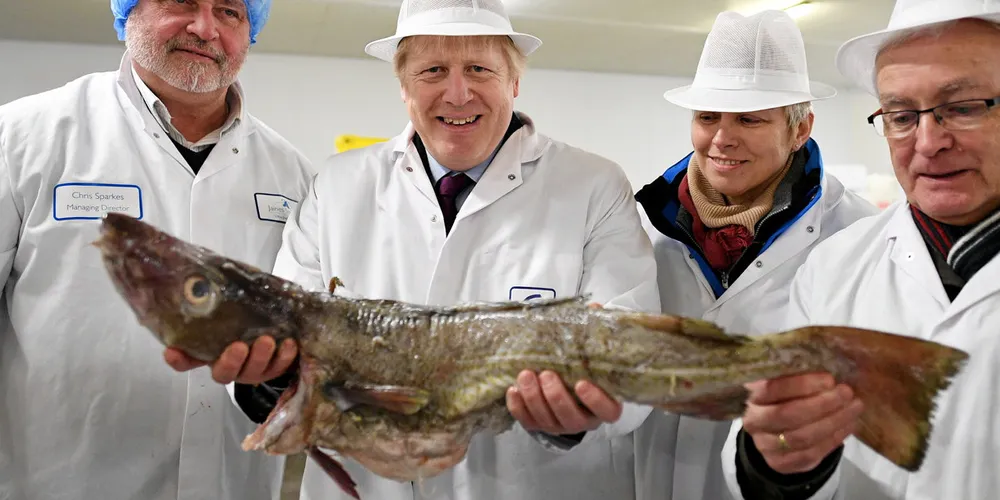Scottish seafood group warns of business closures after post-Brexit exports plunge 80%
An 83% drop in Scottish seafood exports to the EU in January is underlining the strain on the UK fisheries sector.

The Scottish seafood industry is expecting to see some smaller firms fold under the weight of Brexit-related bureaucracy, which sparked an 83 percent drop in exports in January, according to official figures.
Since full Brexit regulations came into force on Jan. 1, confusion over paperwork, extra documentation and IT problems have all contributed to delays and holdups, leading some exporters to halt exports to avoid having their products stuck, rotting in port terminals.
Previously, seafood shipments took 22 hours to get to market, but with UK trading as a "third country" outside of EU rules, the shipment time now can take between 28-39 hours.
With some European customers unwilling to take a chance on inconsistent supply from the United Kingdom, other providers have moved in to take the business.
Seafood Scotland Chief Executive Donna Fordyce said the situation has improved since January after initial teething troubles, but there still needs to be a greater simplification of systems.
Smaller and medium-sized firms have been the worst affected by extra costs, which are running between £250,000-£500,000 (€291,118-€582,189/$347,353-$612,913) a year per business.
Acceptable losses
So with losses reported at 83 percent in January the question is, at what level do losses become "acceptable" to the industry?
"We will see a contraction of businesses in the marketplace," she said.
Meantime, efforts to divert Scottish seafood products to other markets are being stymied, at least for the time being, by a collapse in foodservice business in the United Kingdom and Europe.
This is combined with sky-high airfreight costs to Asia and emerging markets with a great many aircraft grounded because of the lack of passenger traffic linked to the coronavirus crisis.
Tough times
For seafood exporters in the southwest England dependent on shipments to the European Union, these are tough times.
Having shipped no fish at the start of the year, Brixham-based fish merchant Ian Perkes, who relies heavily on sales to Europe's leading processing hub Boulogne-sur-Mer in northern France, is now sending consignments three days a week instead of five, forcing him to lay off workers.
With shipments costing exporters up to an extra £1,000 (€1,164/$1,389) each trip for seemingly endless paperwork requirements, including catch and health certificates as well as customs forms, Perkes said exporters in the region are struggling to see light at the end of the tunnel.
"The delays have got better but the costs stay the same, so we are all struggling," he said.
Perkes, who had to pay a French agent £10,000 (€11,645/$13,897) up front to sort out new VAT requirements, says establishing a French subsidiary is out of the question, a move some larger firms are exploring.
"I have got pals of mine with companies that turn over £20 million (€23.3 million/$27.7 million). They are not looking to go down that route," Perkes said.
"If it's not viable for them, it's certainly not going to be viable for us. "
The exporter recently ordered fish from the Netherlands only to be told that the Dutch exporter no longer found shipping to the United Kingdom attractive because of costs and paperwork.
Numbers tell the story
Figures from the Office for National Statistics showed overall UK exports to the EU fell more than 40 percent in January.
The UK government has tried to deflect the blame, linking the drop to the COVID-19 pandemic and a reduced need to move goods, putting it at odds with road haulers and the Cold Chain Federation trade body.
"I wish the government spent as much time listening to business concerns as they do searching for ways to spin the trade figures," he said.
Back in Scotland, the salmon industry continues to report a mixed picture on deliveries.
Some companies are hiring or using their own transportation services, but there are fears about border disruptions dragging on.
The Scottish Salmon Producers Organisation (SSPO) said they are seeing an improvement in delivery times as they push European Union authorities for a streamlining of complex paperwork requirements.
"The situation, certainly for our bigger members, has improved," an SSPO spokesperson said.
(Copyright)